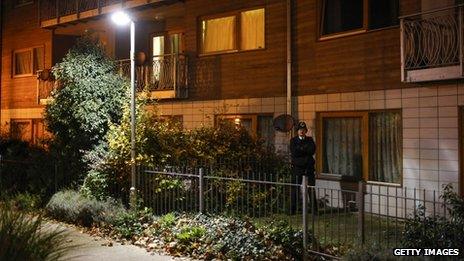Modern slavery all around us, home secretary says
- Published

Theresa May outlined the plans following allegations women were kept in servitude in south London
Slavery in the UK is widespread but new laws will help to eradicate it, the home secretary has said.
Following claims that three women were held for 30 years, Theresa May said figures show the numbers of victims in the UK was up by 25% in the past year.
She told the Sunday Telegraph, external she had made tackling "this abhorrent crime" a "personal priority".
She outlined plans to strengthen anti-slavery laws and appoint a commissioner to hold relevant agencies to account.
Her comments come after three women were rescued last month from a house in south London having allegedly been held as slaves for at least 30 years.
One of the women, a 30-year-old, is thought to have never lived independently.
Two people arrested over the case are both aged 67 and thought to be married. They had been held on suspicion of immigration offences and have been released on police bail until January.
The couple are said to have migrated from India and Tanzania in the 1960s.
Two of the three rescued women had met the man arrested through a "shared political ideology" via a collective.
'Not believed'
The case and the media attention around it had "raised awareness" of the issue, the home secretary said.
But she said modern slavery was "all around us, hidden in plain sight... supplying shops and supermarkets, working in fields, factories or nail bars, trapped in brothels or cowering behind curtains in an ordinary street".
Ms May said the government would:
make trafficking a priority for the new National Crime Agency
introduce a Modern Slavery Bill, increasing sentences for trafficking offences
create an Anti Slavery Commissioner to work on behalf of victims
But she also called on businesses to avoid working with suppliers "involved in trafficking and exploitation".
And she said charities, police forces and other public sector bodies must "work together" to encourage victims to come forward.
Andrew Boff, a Conservative member of the London Assembly told the BBC: "We've had too many cases where somebody's declared 'I've been trafficked' or 'I've been enslaved' and they haven't been believed by the authorities."
On Saturday veteran Labour MP Frank Field, who has been asked to chair a review of the evidence ahead of any new anti-slavery legislation said on Saturday recent cases could be the "tip of the iceberg".
Labour backed the government's plans when they were outlined by the home secretary in summer.
Ms May told the Telegraph: "I will be joining with voices from across the political spectrum, the public and private sector, law enforcement and charities, local and international organisations."
- Published23 November 2013
- Published27 November 2013
- Published23 November 2013
- Published25 August 2013